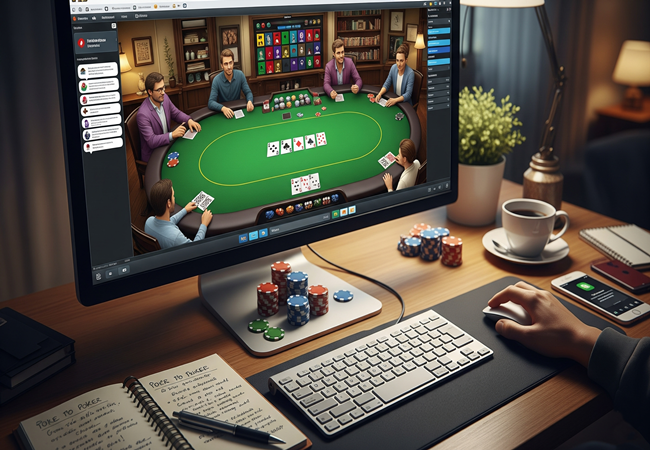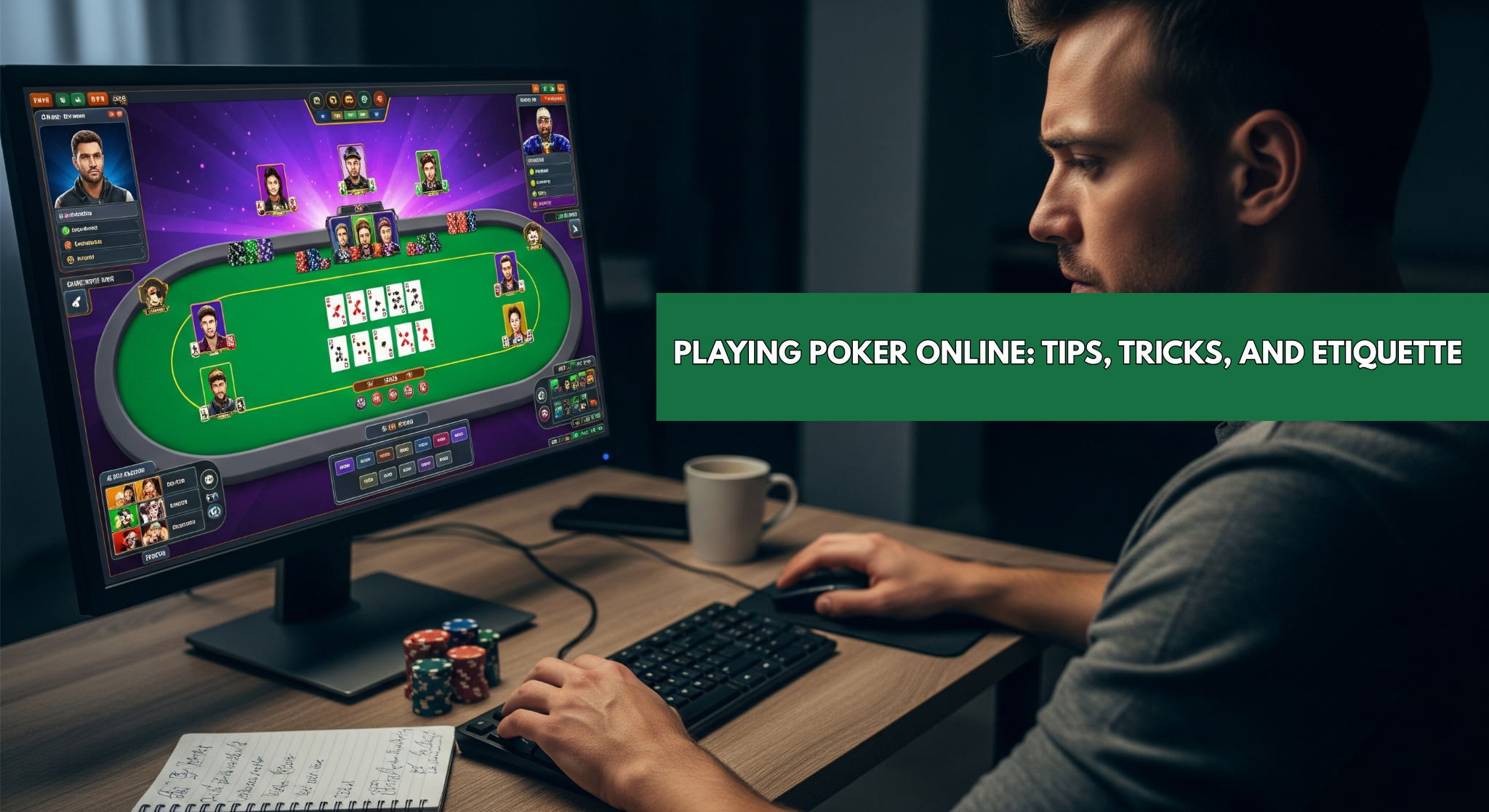Playing Poker Online: Tips, Tricks, and Etiquette
Poker games has long been a staple of social gatherings, casinos, and televised tournaments. In recent years, however, the popularity of playing poker online has skyrocketed. With a smartphone or computer, players can now access games anytime, anywhere—ranging from casual play to high-stakes tournaments. But while the convenience and excitement of Rummy games and online poker are undeniable, succeeding requires more than just luck. To thrive, you’ll need a mix of strategy, self-control, and an understanding of the unwritten rules of online play.
This guide explores essential tips, practical tricks, and the etiquette every player should follow when playing poker online.

Why Play Poker Games Online?
Before diving into the specifics, it’s worth understanding why so many people are drawn to online poker games:
- Accessibility – No need to travel to a casino or find a poker night; online platforms are always open.
- Game Variety – From Texas Hold’em to Omaha and Seven Card Stud, online poker rooms offer countless formats.
- Flexible Stakes – You can start with free games or test your skills in high-stakes cash games.
- Community – Chat functions, live dealers, and global tournaments bring people together across borders.
That said, online poker games can also be intimidating, especially for beginners. Knowing how to navigate the game with Teen Patti Stars makes all the difference
Essential Tips for Online Poker Success
1. Start Small
Whether you’re new to poker or transitioning from live games, begin with low-stakes tables. This reduces financial risk and allows you to get comfortable with the speed and interface of online platforms.
2. Learn the Rules Thoroughly
Each variation of poker comes with its own rules and strategies. Texas Hold’em dominates online platforms, but Omaha and other games are growing in popularity. Make sure you understand hand rankings, betting structures, and pot odds before jumping in.
3. Practice Bankroll Management
One of the most important skills in online poker is managing your money. Decide in advance how much you’re willing to risk and never chase losses. A good rule of thumb is to keep at least 20–30 buy-ins for the stakes you’re playing. This helps you weather inevitable swings in luck.
4. Use Position to Your Advantage
Poker games isn’t just about the cards—it’s also about when you act. Being “on the button” (last to act) gives you a strategic edge since you see how opponents move before making your decision. Avoid playing too many hands from early positions.
5. Limit Distractions
Online poker games can be fast-paced, and one moment of distraction might cost you a hand. Play in a quiet environment, avoid multitasking, and focus on reading the table dynamics.
6. Take Notes and Use Tracking Tools
Most platforms allow you to mark players and write notes. Take advantage of this feature to remember tendencies—like who bluffs often or who plays conservatively. Advanced players often use software that tracks statistics, though beginners should focus on observation first.

Tricks to Gain an Edge
While there’s no guaranteed way to win every hand, certain tricks can tilt the odds in your favor:
1. Play Tighter Than You Think
Beginners often play too many hands out of curiosity. Instead, focus on premium hands and fold more often. Quality over quantity is the way to build consistent results.
2. Bluff Selectively
Bluffing is part of poker’s appeal, but online players in rummy cash games tend to call more frequently than in live games. This means you should bluff less often and only in situations where the story you’re telling makes sense.
3. Watch Betting Patterns
Without physical tells, online poker games relies heavily on betting behavior. Notice how opponents size their bets, how quickly they act, and whether they show aggression only with strong hands.
4. Multi-Table Cautiously
Many platforms allow players to open multiple tables at once. While tempting, only add extra tables when you’re fully comfortable with your decision-making speed. Quality play on one table beats mediocre play across four.
5. Stay Unpredictable
If you always raise with strong hands and fold with weak ones, you become easy to read. Mix up your strategies—occasionally limp with strong hands or bluff in unusual spots—to keep opponents guessing.
Etiquette in Online Poker Games
Online poker games may feel less formal than a casino setting, but etiquette remains essential. Respect for the game and fellow players enhances the experience. Here are key guidelines:
1. Don’t Stall Intentionally
Taking too long to act every turn frustrates opponents and slows down the game. While thinking through decisions is fine, avoid unnecessary delays.
2. Be Respectful in the Chat
Most platforms have chat boxes where players interact. Avoid offensive language, spamming, or insulting others. A little friendly banter is fine, but sportsmanship should always come first.
3. Avoid “Slow Rolling”
A slow roll happens when you delay revealing a winning hand at a showdown. This is considered poor form and disrespectful to opponents. Reveal your cards promptly when it’s your turn.
4. Don’t Discuss Hands in Play
If you’ve folded, don’t comment on the hand while others are still involved. This disrupts the flow and could influence decisions unfairly.
5. Respect Platform Rules
Every online poker site and rummy apps have their own terms of service. This includes restrictions on collusion, using prohibited software, or exploiting technical glitches. Play fair to protect both your account and the integrity of the game.
Common Mistakes to Avoid
Even experienced players slip up. Watch out for these pitfalls:
- Playing tired or tilted – Emotional or fatigued players make poor decisions.
- Ignoring table dynamics – Treating every table the same overlooks differences in playstyles.
- Overvaluing weak hands – Don’t fall in love with a pair of aces when the board screams danger.
- Chasing every draw – Not every flush or straight is worth pursuing if the pot odds don’t justify it.
Balancing Fun and Competition
At its core, poker is both a game of skill and entertainment. Online play allows for a balance between casual fun and serious competition. Some people play to relax with friends, while others aim for tournament titles and financial rewards. Whatever your goal, remember that responsible play ensures long-term enjoyment.
Set limits on time and money spent, and know when to step away. A healthy mindset will help you enjoy the highs and endure the lows without letting poker games take over your life.
Final Thoughts
Playing poker games online is more than just clicking buttons and hoping for lucky cards. It’s about rummy strategies, discipline, and mutual respect among players. By starting small, managing your bankroll wisely, learning table etiquette, and sharpening your skills with practice, you can enhance both your enjoyment and success.
Whether you dream of climbing the ranks in global tournaments or simply enjoy a casual evening game, the combination of tips, tricks, and etiquette outlined here will help you navigate the exciting world of online poker games.







